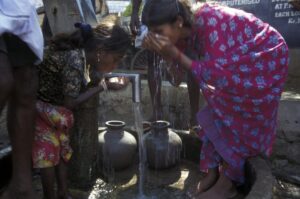
Pollution is not only corroding our air but has made most of India’s groundwater undrinkable. An investigation by the Central Ground Water Board (CGWB) has found high levels of groundwater contamination across the country.
Groundwater exists underground in the pores of the soil and cracks in the rock. Its significance is often overlooked. However, groundwater is of critical importance to India. According to the World Bank, 85 percent of drinking water supplies in India depend on groundwater.
Industry, landfilling and agriculture using fertilisers and pesticides are potentially to blame for this. Such activities discharge substantial volumes of effluents including nitrate, fluoride and heavy metals. These discharges then contaminate groundwater supplies.
Nitrates is particularly prevalent in India’s groundwater. Commonly used as fertilisers in agriculture, nitrates are present in groundwater in 386 of India’s 718 districts, at levels higher than what is considered acceptable by the Bureau of Indian Standards (BIS). Excess concentrations of nitrates in drinking water is linked to methemoglobinemia, a condition where there is too much methemoglobin (a form of the oxygen-carrying protein haemoglobin). This impairs the ability of red blood cells to carry oxygen.
Further cause for concern is the elevated presence of heavy metals in groundwater supplies in a number of areas. Arsenic, lead, chromium and cadmium are present at excess levels in 153, 93, 30 and 24 districts respectively. In large quantities they can prove toxic – linked to birth defects, damage to the central nervous systems, and cancer.
The rapid urbanisation and industrialisation in recent decades has driven increased production of solid waste – to the tune of 960 million tonnes. Much of this waste is improperly treated and gets dumped at landfill, which can then contaminate groundwater. Meanwhile, the emission of pollutants by industries has increased sharply in recent decades, furthering pollution levels.
The summation of this and other factors could be a water crisis in future. Almost a fifth of the world’s people who lack access to clean, safe drinking water already live in India. Groundwater contamination only increases the likelihood of a future water crisis plaguing a nation home to more than 1.3 billion people. Is this really a risk India can afford to take?

